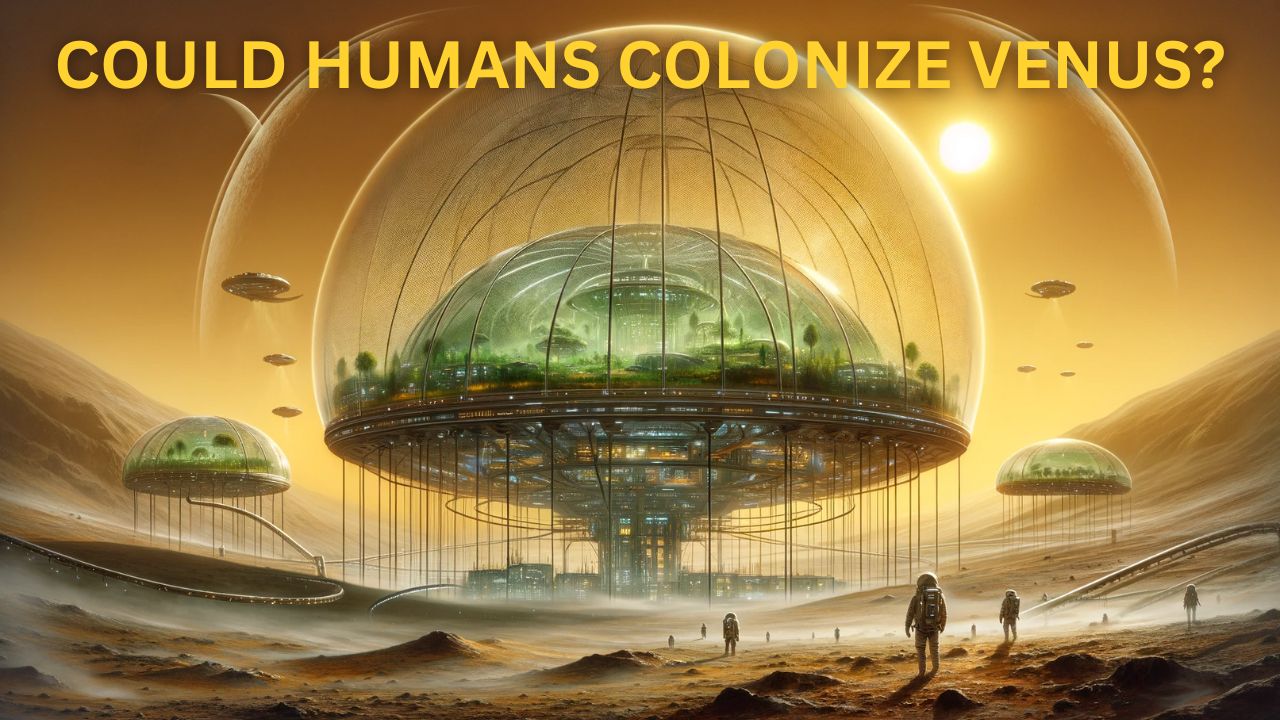https://www.youtube.com/watch?v=mOEstZ7dc40
The Possibility of Life on Venus
In the 19th century, scientists believed Venus had an atmosphere similar to Earth’s, with water vapour and oxygen. This led to the idea that life, particularly plants, could exist on Venus. However, more refined observations and spacecraft missions have shown that Venus’s atmosphere is mostly carbon dioxide, with only slight traces of water. The exacting conditions required for the origin of life may not have been satisfied on Venus, but the possibility of life hidden beneath the thick clouds cannot be ruled out entirely.
The Harsh Conditions of Venus
Venus is known for its scorching temperatures, crushing atmospheric pressure, and acid rain. The surface temperatures on Venus can reach up to 467 degrees Celsius (872 degrees Fahrenheit). The atmospheric pressure is equivalent to 900 meters (2950 feet) underwater, instantly crushing anything in its path. The corrosive atmosphere and acid rain make it highly challenging for any equipment or living organisms to survive on the surface.
Colonizing Venus: A Hypothetical Journey
Despite the dangers, some people believe Venus could be a better planet for human settlement than Mars. However, extensive testing and information gathering are necessary before humans can set foot on Venus.
Robotic Missions and Mapping
Since 1961, spacecraft have been flying by and profiling Venus, providing valuable information about its topography, atmospheric pressure, and overall conditions. However, there is still much to learn about the Venusian surface.
The Challenge of Colonization
Efforts to colonize Venus have been met with trial and error. The extreme conditions of the planet’s surface have proven to be a significant obstacle. Even with superheat-resistant astronaut suits, the scorching temperatures and crushing atmospheric pressure make it nearly impossible for humans to survive on the surface. Additionally, the corrosive atmosphere and acid rain would quickly destroy any equipment.
Terraforming Venus: Making it More Earth-like
Another approach to colonization is terraforming Venus to make it more habitable. However, this would present its own set of challenges.
Eliminating Carbon Dioxide and Sulfuric Clouds
The carbon dioxide and sulfuric clouds on Venus must be eliminated to create an atmosphere similar to Earth’s. One possible solution is to introduce genetically engineered microorganisms that absorb carbon dioxide. However, this would require significant advancements in technology and resources.
Reducing Solar Radiation and Cooling the Planet
The scorching temperature on Venus could be mitigated by setting up solar shades in space. These shades would redirect the sun’s rays to reduce solar radiation and cool the planet over time. However, such a large-scale operation would require advancements that are currently beyond our reach.
A Cloud City Above Venus
Considering the challenges of living on the surface, a new plan for colonizing Venus has emerged: creating cloud cities suspended 50 kilometres (31 miles) above the planet’s surface.
A Comfortable Environment
These cloud cities would provide a relatively comfortable environment for humans. The atmospheric pressure at this altitude would not crush individuals, and the temperature would be more moderate.
Living in Blimps
The cloud cities would consist of blimps made of Teflon, which would be suspended in the clouds. Each blimp could serve a different purpose and accommodate different groups of people, all connected by covered bridges for easy travel.
Protection from Solar Radiation
One advantage of the cloud cities is protection from harmful solar radiation due to Venus’s thick atmosphere. This is a feature that Mars cannot offer.
Conclusion
While colonizing Venus presents significant challenges, the concept of cloud cities above the planet’s surface offers a potential solution. These cloud cities could provide humans with a comfortable environment and protection from the harsh conditions on the surface. However, it is essential to note that such a feat is beyond our technological capabilities and may remain in science fiction for now.
FAQs: Could Humans Colonize Venus?
Q: Why would we want to colonize Venus?
A: Several reasons make Venus a potential candidate for colonization:
- Similarities to Earth: Venus has a similar size, gravity, and day-night cycle as Earth, making it a potentially easier target for terraforming than other planets.
- Resources: Venus is believed to have vast resources, including water ice trapped in its poles, metals, and minerals, which could be valuable for future civilizations.
- Scientific exploration: Understanding and terraforming Venus could provide valuable insights into the history of our planet and the potential for life on other worlds.
Q: Is colonizing Venus even possible?
A: While currently impossible with our existing technology, colonizing Venus is theoretically possible. With significant advancements in terraforming, robotics, and life support systems, we could potentially create a habitable environment on the planet.
Q: What are the biggest challenges to colonizing Venus?
A: Venus presents several significant challenges for colonization:
- Extreme temperature: The surface temperature on Venus is around 462°C (863°F), hot enough to melt lead.
- Toxic atmosphere: The Venusian atmosphere is composed primarily of carbon dioxide, with sulfuric acid clouds, making it extremely poisonous to humans.
- High pressure: The pressure on the surface of Venus is 90 times greater than Earth’s, crushing anything that isn’t specially designed to withstand it.
Q: How could we overcome these challenges?
Researchers are exploring various solutions to Venus’s harsh environment:
- Sunshades: Blocking sunlight with space-based sunshades could significantly reduce the planet’s temperature.
- Atmosphere scrubbers: Technologies to remove carbon dioxide and sulfur dioxide from the atmosphere could make it breathable for humans.
- Floating cities: Building floating habitats in the Venusian atmosphere could offer protection from the surface’s harsh conditions.
- Genetic engineering: Developing extremophile plants and microbes that can survive and thrive in the Venusian environment is crucial for terraforming the planet.
Q: When could we colonize Venus?
Given the enormous challenges involved, colonizing Venus is likely centuries or even millennia away. We need significant technological advancements and a sustained global effort before it becomes a reality.
Q: What are the ethical considerations of colonizing Venus?
Colonizing Venus raises several ethical questions:
- The impact on potential native life: If Venus harbours any life forms, colonizing it could lead to their extinction or disruption of their ecosystem.
- Resource exploitation: Ensuring responsible and sustainable resource extraction on another planet is crucial.
- Equity and access: Who would have the right to colonize Venus, and how could we ensure equitable access to this new frontier?
These are just some of the many questions surrounding the potential for colonizing Venus. As we continue exploring and understanding this enigmatic planet, the answers to these questions will become increasingly important in shaping the future of our species and our relationship with the universe.









